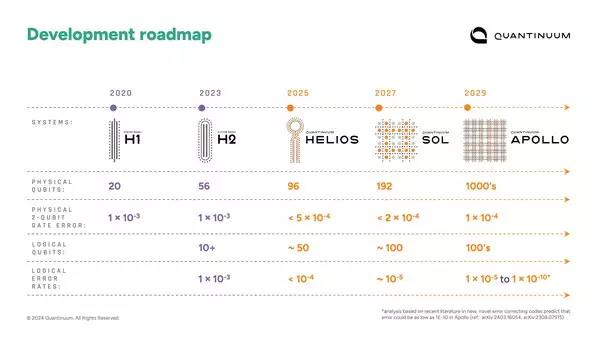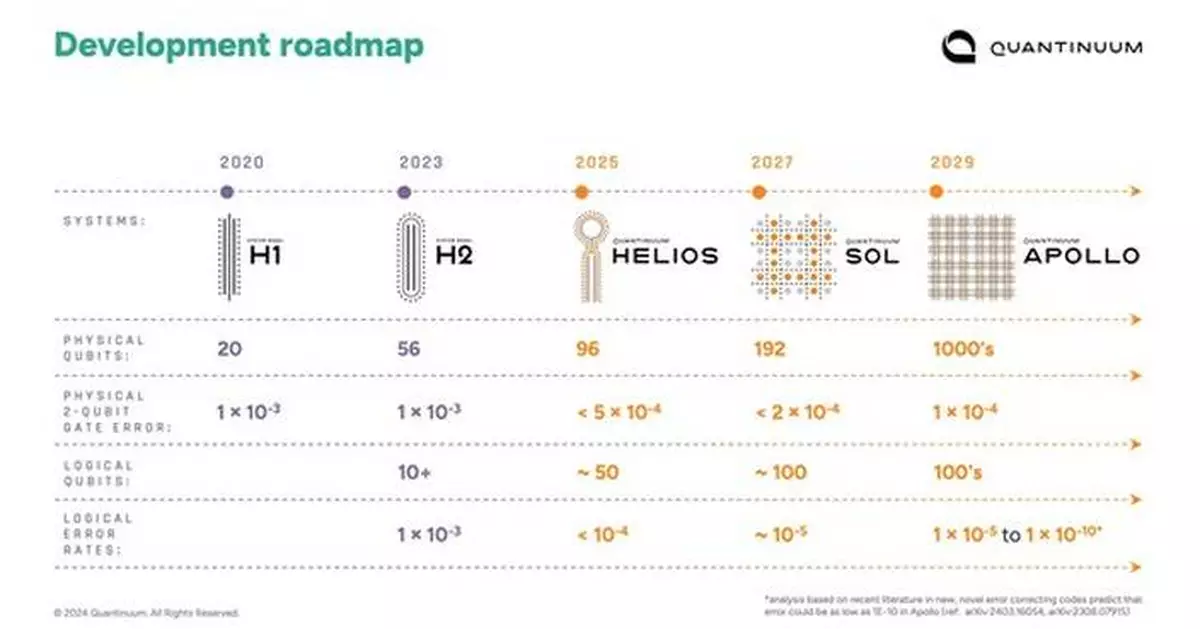With thousands of physical qubits, hundreds of logical qubits, low error rates, and a fully integrated software stack, Quantinuum's roadmap outlines its path to achieve scientific advantage and a tipping point for commercial advantage
In collaboration with Microsoft, Quantinuum also demonstrates two industry firsts: 12 logical qubits and an end-to-end scientific workflow using AI, High-Performance Computing (HPC), and logical qubits on what Microsoft has previously described as "the path to a Quantum Supercomputer"
BROOMFIELD, Colo. and LONDON, Sept. 10, 2024 /PRNewswire/ -- Today, Quantinuum, the world's largest and leading integrated quantum computing company, unveiled its roadmap to universal, fault-tolerant quantum computing by 2030. The roadmap materially accelerates the path to commercial quantum computing systems with the potential to unlock a trillion-dollar market[1] and enable AI to help solve some of the world's most pressing problems. In parallel, Quantinuum in partnership with Microsoft announced a series of milestones and integrations.
Quantinuum's roadmap unveils its fifth-generation quantum computer, Apollo, which will be a fully fault-tolerant and universal quantum computer, capable of executing circuits with millions of gates, delivering scientific advantage and enabling a commercial tipping point.
"We are the only company with a clear and demonstrable path that leverages quantum computing to tackle large-scale scientific and commercial applications," said Dr Rajeeb Hazra, CEO of Quantinuum. "With our proven record of driving technological advancement and the unwavering trust of our global customers and partners, we are confident that we possess the industry's most credible roadmap toward achieving universal fault-tolerant quantum computing."
The roadmap is built on the foundations of Quantinuum's fully scalable quantum charge-coupled device (QCCD) architecture, including a universal gate set and high-fidelity physical qubits uniquely capable of supporting reliable logical qubits. For four years now, Quantinuum has remained steadfast in providing data along with peer-reviewed papers to show the science and engineering work behind these methodical advances.
"Our next system, Quantinuum Helios, will support enough logical qubits to unlock scientific and mathematics advances that will clearly surpass classical computing," Hazra said. "Our roadmap then draws a direct line to hundreds of logical qubits, at which point quantum computing will outperform classical computing to address a broad range of scientific problems in areas like finance, chemistry, and computational biology. We also know, from experience, that utility in the form of applications that are suitable for global enterprises and governments will likely bubble to the surface and increase rapidly over the next 18 months. Our quantum computers are already impossible to simulate classically."
Quantinuum also announced another milestone today in collaboration with Microsoft: achieving 12 logical qubits on the newly updated 56-qubit System Model H2 quantum computer, a 3x advance over the four logical qubits the companies announced in April. Microsoft also used the System Model H1 quantum computer to run the first ever chemistry simulation using reliable logical qubits combined with AI and HPC to produce results within chemical accuracy. Finally, Quantinuum and Microsoft have completed the integration of Quantinuum's InQuantoâ„¢ computational quantum chemistry software package with Azure Quantum Elements, making it available to customers through private preview.
"The collaboration between Quantinuum and Microsoft has established a crucial step forward for the industry and demonstrated a critical milestone on the path to hybrid classical-quantum supercomputing capable of transforming scientific discovery," said Dr Krysta Svore – Technical Fellow and VP of Advanced Quantum Development for Microsoft Azure Quantum.
"It is now clear that enterprises need to be ready to take advantage of the progress we can see coming in the next business cycle," Hazra said. "Our customers are placing quantum in their strategic plans and finding new ways to align our quantum system with classical computing and generative AI."
In 2019, Quantinuum's H-Series devices were among the first to be offered commercially via Microsoft Azure. Today, Quantinuum's H1 and H2 quantum computers, Powered by Honeywell, remain available on Azure and directly to Quantinuum customers and partners.
In the past few years, Quantinuum has achieved many significant milestones, including
A blog post with more details on the Quantinuum quantum hardware roadmap can be viewed here. The Microsoft announcement regarding the 12 logical qubits can viewed here.
About Quantinuum
Quantinuum, the world's largest integrated quantum computing company, pioneers powerful quantum computers and advanced software solutions. Quantinuum's technology drives breakthroughs in materials discovery, cybersecurity, and next-gen quantum AI. With over 500 employees, including 370+ scientists and engineers, Quantinuum leads the quantum computing revolution across continents.
[1] Source: Quantum Technology Monitor, McKinsey 2023
** The press release content is from PR Newswire. Bastille Post is not involved in its creation. **

Quantinuum Unveils Accelerated Roadmap to Achieve Universal, Fault-Tolerant Quantum Computing by 2030
SHENZHEN, China, Dec. 21, 2024 /PRNewswire/ -- As technology continues to evolve, consumer electronics have become essential to everyday life. Elephant Robotics, a high-tech company specializing in robotics design and production, is thrilled to announce its participation in the International Consumer Electronics Show (CES) 2025. This premier technology trade show will be held in Las Vegas, USA, from January 7-10, where you can find Elephant Robotics at Booth 8963 in the LVCC North Hall.
With a mission to "Enjoy Robots World", the company offers a diverse range of robotic products, including educational collaborative robots, professional robots, the Mercury humanoid robot, and bionic companion robotic pets. Committed to pushing the boundaries of robotics technology, Elephant Robotics aims to provide everyone with opportunities to experience the convenience and benefits of robots in daily life. At CES 2025, the company will showcase innovative robotic solutions and host 3 engaging interactive activities.
Elephant Robotics is dedicated to reducing the barriers to robot applications by offering a diverse range of personal desktop robots, including 4 DOF collaborative robotic arms, 6 DOF cobots, 7 DOF robot arms, and mobile robots. These intelligent robot assistants are characterized by their versatility, high openness, cost-effectiveness, and ease of use, making them perfect for creative projects, daily tasks, and production applications. Equipped with a variety of end effectors—including cameras, suction pumps, grippers, and dexterous hands—these robots can perform a wide range of tasks. This versatility enhances the practicality of robotic arms, reducing the workload and increasing efficiency, allowing people to spend more time on creative and recreational activities. Ultimately, these robotics innovations enhance convenience and joy in everyday life. Whether functioning as personal assistants, production tools, or artistic platforms, they are becoming essential components of modern living.
Alongside personal entertainment and convenience, the broad commercial applications of robotics technology are a significant aspect of future intelligent living. At CES 2025, Elephant Robotics will present 2 commercial collaborative robots with powerful performance and sleek, integrated design aesthetics.
The myCobot Pro 630, a high-performance commercial collaborative robot, boasts a sleek integrated design and advanced capabilities. Equipped with a holographic device, it provides an immersive and dynamic experience for commercial displays and exhibitions, enabling multi-angle movement and captivating 3D visual effects. This robot offers a fresh approach to business marketing and displays with impressive flexibility and a wide range of applications.
Additionally, the Mercury X1, a universal wheeled humanoid robot, features a mobile chassis with high-performance LiDAR and 19 DOF dual-arm robotic arms, delivering exceptional agility and intelligence. Mercury X1 can work seamlessly alongside humans to improve efficiency, reduce costs, and expand commercial opportunities in sectors such as service, hospitality, education, scientific and academic research, entertainment and smart home applications. Since its official launch in late 2023, Mercury X1 has received significant market attention, already delivering notable success in sectors like electronics, chips, and the 3C industry. Since its official launch in late 2023, the Mercury X1 has garnered significant market attention, achieving mass delivery just 7 months post-launch. This versatile wheeled humanoid robot is easily integrated into light industrial manufacturing, particularly in sectors such as electronics, and chips. There are some already successful applications include stripping adhesive sleeves from mobile phone components and assembling flexible connectors. By replacing manual labor, the Mercury X1 improves work efficiency and reduces costs.
Robots can also be soft and cuddly, bionic companion robot pets are set to become the most heartwarming intelligent companions in daily life. Elephant Robotics will unveil its new series of bionic robotic pets—metaCat AI, metaDog AI, and metaPanda AI—at CES 2025. These AI bionic robotic pets, available in cat, dog, and panda shapes, closely mimic the appearance, texture, sound, and experience of real animals, fulfilling people's need for companionship and emotional comfort. Equipped with AI models, they understand human language and emotions, providing a life-like interaction experience.
Designed to provide companionship and emotional support, these pets are equipped with lifelike features such as realistic fur, interactive movements, and engaging behaviors. These AI bionic companions understand human emotions and can respond to voice commands, offering a truly immersive and responsive interaction. Equipped with AI models, they understand human language and emotions, providing a "life-like" smart interaction experience.
Particularly beneficial for children, seniors, and individuals with autism or Alzheimer's disease, these AI bionic companion robotic pets help reduce feelings of loneliness, alleviate anxiety, and promote mental well-being. In addition, their AI capabilities allow them to engage in dynamic, lifelike conversations, and even respond to emotional cues, fostering deeper connections with users. In family environments, these pets can serve as both educational and comforting companions, while in healthcare settings, they offer potential in emotional support and mental care. They represent a new frontier in human-robot interaction, where robotics not only enhance productivity but also improve emotional quality of life.
Elephant Robotics is not only showcasing its cutting-edge robotic products at CES 2025, but is also offering visitors the opportunity to participate in 3 exciting interactive activities.
Innovative Robotics Workshop: In this hands-on workshop, visitors will experience the power of graphical programming tools like myBlockly to control the 6 DOF collaborative robot arm, myCobot 280. By arranging code "blocks" in a fun and intuitive way, participants can easily bring their creative ideas to life. The workshop simplifies programming, allowing participants to enhance their practical skills and hands-on experience through direct interaction with various robotic products. This engaging environment encourages more people to explore the applications of robotic arms in everyday life.
Share & Win: Visitors can participate by sharing posts on social media platforms (Facebook, X, LinkedIn) with the hashtag #ElephantRobotics to win a free, limited-edition panda doll keychain. It's an easy and fun way to engage with the brand while standing a chance to win a unique souvenir!
Explore to Win – NVIDA and Partner Passport Program: As an official NVIDIA partner, Elephant Robotics is honored to be invited to participate in the Explore to Win event, part of the NVIDIA and Partner Passport Program at CES 2025. Visitors who scan the QR code at Elephant Robotics' booth (LVCC, North Hall – booth #8963) will be able to collect points and have a chance to win exciting prizes.
CES 2025 is an unparalleled platform for showcasing cutting-edge technology and fostering idea exchange. Participation in CES 2025 allows Elephant Robotics to showcase its latest robotic innovations and emphasize its mission to integrate AI and robotics into everyday life. It also offers opportunities to explore collaborations with international organizations and companies, fostering loyalty and trust among its customers. Visitors are encouraged to visit the company's booth at LVCC North Hall – booth 8963 to experience their innovative robotics technologies firsthand and discover how these innovations can transform everyday's life.
For more information, please visit: CES2025 - Elephant Robotics; or connect with them on social media:
X: https://twitter.com/CobotMy
Facebook: https://www.facebook.com/mycobotcreator
Linkedin: https://www.linkedin.com/company/elephantrobotics/
Youtube: https://www.youtube.com/c/elephantrobotics
** The press release content is from PR Newswire. Bastille Post is not involved in its creation. **

Elephant Robotics to Exhibit at CES 2025: Featuring Cutting-Edge Innovative Robotics Solutions and AI Bionic Robots Debut











